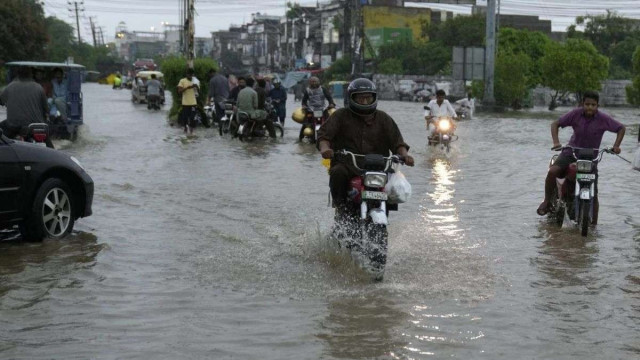Monsoon deluge exposes gaps in water storage capabilities
IMF, UNDP reports warn of potential scarcity by 2040

Monsoon rains, a vital natural phenomenon for Pakistan, have once again highlighted the country's inability to effectively manage and store water.
While these rains are crucial for nourishing the soil and supporting agriculture, Pakistan's poor water storage infrastructure turns this blessing into a source of urban flooding and wastage.
The monsoon season in the subcontinent spans four months, from June to September.
This year, the Pakistan Meteorological Department predicted 35% more rainfall than usual, and the rains have been ongoing since late June.
Despite the abundance of water, Pakistan fails to capitalise on it, storing only 10% of its rainwater compared to the global standard of 40%.
Neighbouring India, with a storage capacity of 33%, can store water for 190 days and aims to increase this capacity to 250 days by 2030.
In contrast, Pakistan can only store water for 30 days.
Each year, Pakistan receives between 500-1500 mm of rainfall, equating to approximately 145 million acre-feet of water.
However, due to inadequate storage facilities, the country loses water worth around Rs21 billion annually, saving only 13.7 million acre-feet.
A report by the Indus River System Authority (IRSA) presented in the Senate recommended the construction of three additional dams, similar in size to the Mangla Dam, to address this issue. International organisations, including the IMF and UNDP, have also raised alarms over Pakistan's escalating water crisis, warning that by 2040, the country could become the most water-scarce in the region.
Pakistan currently ranks third among countries facing severe water shortages and fourth in water wastage.
The Pakistan Council of Research on Water Resources (PCRWR) has issued a stark warning that the country may face critical water shortages by 2025.
Last year, due to insufficient storage capacity, 40 million acre-feet of rainwater flowed into the sea during the monsoon season, resulting in an 18% water shortage, as announced by IRSA on September 30.
In response to the crisis, MD WASA Ghufran Farooq Ahmed stated that the Punjab government has approved funding for the construction of 10 underground water tanks, with the largest tank, capable of storing 400,000 gallons, being built at Qaddafi Stadium. However, experts stress that more comprehensive solutions are needed.
Hamidullah Malik, Director of the PDMA South Region, emphasised that solving the water scarcity problem requires collective effort.
He recommended that every household should have an underground water tank and a small well to recharge groundwater.
Malik suggested that the government should mandate underground water tanks in building designs before approval.
Environmental expert Dr Younus Zahid urged the establishment of a Water Management Authority dedicated to groundwater recharge and water storage.
He warned that if urgent action is not taken, Pakistan could soon face a dire situation where future generations are left without access to sufficient water resources.


















COMMENTS
Comments are moderated and generally will be posted if they are on-topic and not abusive.
For more information, please see our Comments FAQ